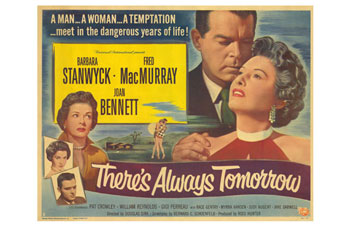There's Always Tomorrow (1956)
There's Always Tomorrow (1956), directed by Douglas Sirk.
I've neglected the 1950s weepie genre (melodramatic overwrought things-just-keep-getting-worse tear-jerkers) so far, but now have several Douglas Sirk titles in the queue. Sirk was the master of the form, which reminds me of an old quote by David Cronenberg: asked how it felt to be the king of venereal horror, he said "Venereal horror may be a small genre, but at least I'm king of it!"
The value of a weepie has been recognized since ancient times: when you are oppressed by ill fortune and the injustice of life, go see a tragedy and cry it out. (Similarly, when romantically disappointed, see a sex farce and laugh it out).
Fred MacMurray has a fine wife in Joan Bennet and three great kids, but feels in a rut. The family doesn't have much time for him and he thinks the kids are pushing him aside. When old flame Barbara Stanwyck shows up they spend a lot of time together talking about the old days and he feels young again. They never get around to adultery but it is headed that way. The kids figure out something is up and put an end to it.
I wouldn't have watched this sort of soap opera when I was young and wouldn't have understood it, but now I do. "I'm not ready to be old yet" is a terrible feeling but time doesn't wait for you to figure out what to do. Hence the famous midlife crisis. In the end Stanwyck gives him the weepie moral straight up: you can't be young again, there is no going back, you need to shoulder your burden and just grow old without complaining. He does so, but looks like a broken man to me.
Third and last pairing of MacMurray and Stanwyck. Sirk's All I Desire (1953), also with Stanwyck, is on the same disc.

